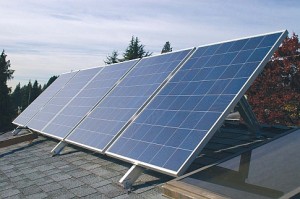Solar surge sparked 2011 renewables boom
 The surge in solar, biomass and offshore wind installations were the main drivers behind a 33 per cent increase in green electricity production last year, according to new government figures that also show the UK imported more energy than it exported for the first time since 1974.
The surge in solar, biomass and offshore wind installations were the main drivers behind a 33 per cent increase in green electricity production last year, according to new government figures that also show the UK imported more energy than it exported for the first time since 1974.The Department of Energy and Climate Change (DECC) today published new figures showing renewable electricity accounted for 9.4 per cent of total UK electricity generation in 2011, increasing from 6.8 per cent in 2010.
The increase was driven predominately by a 12-fold increase in solar power capacity, as investors and homeowners attempted to secure a higher rate of feed-in tariff ahead of a series of cuts to the subsidy.
Biomass capacity also trebled last year, after the Tilbury power station converted from coal to dedicated biomass and offshore wind capacity increased 37 per cent as a series of new wind farms came online.
Meanwhile, combined heat and power (CHP) capacity increased by one per cent to just over 6GWe.
The increase in renewable generation was accompanied by a sharp fall in oil and gas production, meaning primary energy consumption last year fell by a record 13.2 per cent from 2010.
Energy consumption also fell 6.9 per cent in real terms, largely as a result of warmer weather, although the government will also be heartened by evidence suggesting that energy efficiency measures are helping to curb demand.
However, the reduction in domestic oil and gas production meant the UK imported more energy than it exported for the first time since 1974, mostly in the form of oil and gas from Norway.
The UK increased its import dependency level to 36 per cent, continuing an upward trend from 2004 when it once again became a net importer of fuel. The UK imported more coal, manufactured fuels, crude oil, electricity and gas than it exported; however, the UK remained a net exporter of petroleum products.
Commenting on the news, Maria McCaffery, chief executive of RenewableUK, said renewable energy technologies were playing an increasingly important role in the energy mix.
“This trend is set to continue and will help the UK to reduce its over-reliance on expensive and unpredictable supplies of imported fossil fuels,” she said.
“With the economy in a fragile state we need to do everything we can to boost investor confidence and ensure that the UK develops an energy mix that will not only protect consumers from fluctuating fossil fuel prices in the short term but will also deliver long term security and growth.”
You can return to the main Market News page, or press the Back button on your browser.

